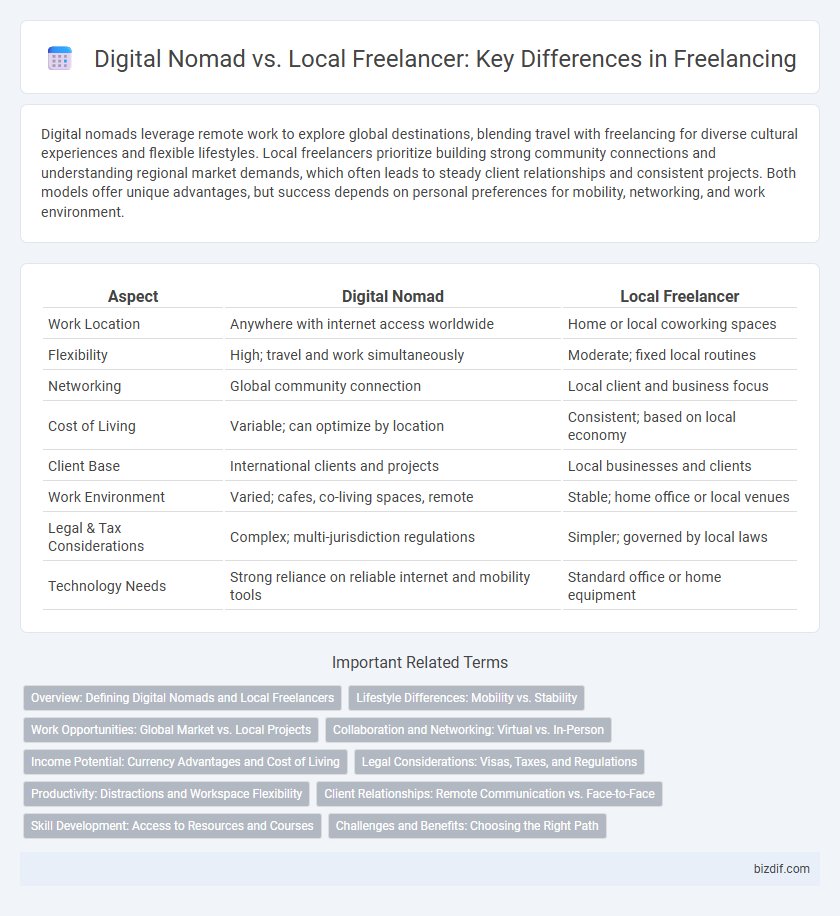Digital nomads leverage remote work to explore global destinations, blending travel with freelancing for diverse cultural experiences and flexible lifestyles. Local freelancers prioritize building strong community connections and understanding regional market demands, which often leads to steady client relationships and consistent projects. Both models offer unique advantages, but success depends on personal preferences for mobility, networking, and work environment.
Table of Comparison
| Aspect | Digital Nomad | Local Freelancer |
|---|---|---|
| Work Location | Anywhere with internet access worldwide | Home or local coworking spaces |
| Flexibility | High; travel and work simultaneously | Moderate; fixed local routines |
| Networking | Global community connection | Local client and business focus |
| Cost of Living | Variable; can optimize by location | Consistent; based on local economy |
| Client Base | International clients and projects | Local businesses and clients |
| Work Environment | Varied; cafes, co-living spaces, remote | Stable; home office or local venues |
| Legal & Tax Considerations | Complex; multi-jurisdiction regulations | Simpler; governed by local laws |
| Technology Needs | Strong reliance on reliable internet and mobility tools | Standard office or home equipment |
Overview: Defining Digital Nomads and Local Freelancers
Digital nomads are remote professionals who leverage technology to work from various global locations, embracing mobility and flexibility as core aspects of their lifestyle. Local freelancers typically operate within a fixed geographic area, offering services tailored to nearby clients and benefiting from in-person networking opportunities. Both digital nomads and local freelancers utilize diverse digital platforms for project acquisition, yet their work environments and client engagement strategies significantly differ based on location and mobility preferences.
Lifestyle Differences: Mobility vs. Stability
Digital nomads embrace a highly mobile lifestyle, working from various global locations using only a laptop and internet connection, which offers unparalleled flexibility and cultural exposure. Local freelancers prioritize stability by maintaining a consistent work environment within their home region, fostering strong local networks and routine-based productivity. This contrast between mobility and stability significantly impacts work-life balance, client interactions, and personal well-being among freelancers.
Work Opportunities: Global Market vs. Local Projects
Digital nomads leverage a vast global market, accessing diverse projects across multiple time zones and industries, which often results in higher earning potential and varied client portfolios. Local freelancers typically focus on regional clients and projects, benefiting from face-to-face networking and localized market knowledge but facing limited opportunities compared to global demand. The global reach of digital nomads enables continuous work flow and adaptability to different cultures and business practices, while local freelancers excel in specialized niche markets within their communities.
Collaboration and Networking: Virtual vs. In-Person
Digital nomads leverage virtual collaboration tools and global networks to connect with clients and peers across diverse time zones, enhancing flexibility and exposure to international perspectives. Local freelancers benefit from in-person interactions, fostering stronger community ties, trust, and immediate feedback through face-to-face networking events and local industry meetups. Balancing virtual platforms with local collaborations can optimize project outcomes and expand professional opportunities for both digital nomads and local freelancers.
Income Potential: Currency Advantages and Cost of Living
Digital nomads often benefit from earning in strong currencies like USD or EUR while living in countries with a lower cost of living, maximizing their income potential. Local freelancers earn in their native currency, which can limit earning power depending on the domestic economic conditions and inflation rates. Understanding currency exchange trends and regional living expenses is crucial for freelancers to optimize their financial growth.
Legal Considerations: Visas, Taxes, and Regulations
Digital nomads must navigate complex visa requirements and international tax laws to comply with each country's regulations, often needing specialized digital nomad visas or remote work permits. Local freelancers face simpler legal frameworks, typically limited to domestic business registration, income tax filing, and local labor laws. Understanding the differences in taxation treaties, social security obligations, and visa limitations is crucial for both to avoid legal penalties and optimize financial responsibilities.
Productivity: Distractions and Workspace Flexibility
Digital nomads benefit from workspace flexibility, allowing them to choose environments that boost creativity and productivity, though they often face distractions from travel logistics and changing locations. Local freelancers enjoy stable, familiar workspaces that reduce external interruptions but may struggle with monotony and limited networking opportunities. Balancing workspace flexibility with minimizing distractions is key for both digital nomads and local freelancers to maximize productivity.
Client Relationships: Remote Communication vs. Face-to-Face
Digital nomads leverage tools like video calls and instant messaging to maintain client relationships across time zones, emphasizing flexibility and asynchronous communication. Local freelancers benefit from face-to-face meetings that foster deeper trust and immediate feedback, enhancing collaboration and understanding. Both approaches require adapting communication styles to build successful, long-term client connections in freelancing.
Skill Development: Access to Resources and Courses
Digital nomads often benefit from diverse online resources and global skill development platforms, enabling access to cutting-edge courses and workshops unavailable locally. Local freelancers may rely more on community-based training and regional institutions, which offer tailored programs but sometimes lack the breadth of global digital content. Leveraging online certifications and international webinars, digital nomads enhance their expertise faster, while local freelancers strengthen skills through localized mentorship and in-person networking.
Challenges and Benefits: Choosing the Right Path
Digital nomads face challenges such as unstable internet connectivity, time zone differences, and visa restrictions, but benefit from cultural experiences and flexible work environments. Local freelancers enjoy stable infrastructure, easier client communication, and local market knowledge, yet may encounter limited networking opportunities and lower earning potential. Evaluating personal adaptability, lifestyle preferences, and professional goals helps determine the ideal freelancing path.
Digital nomad vs Local freelancer Infographic

 bizdif.com
bizdif.com